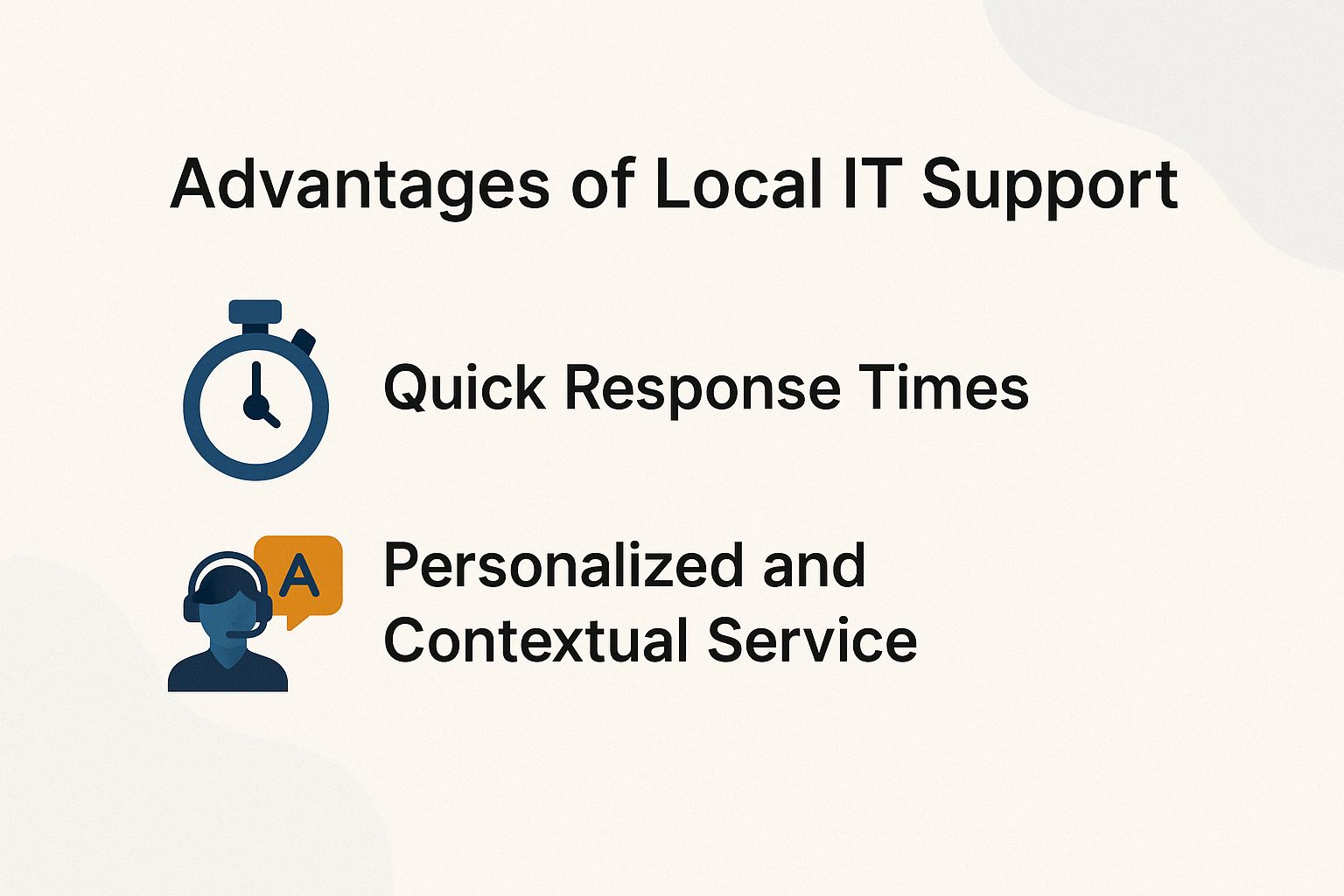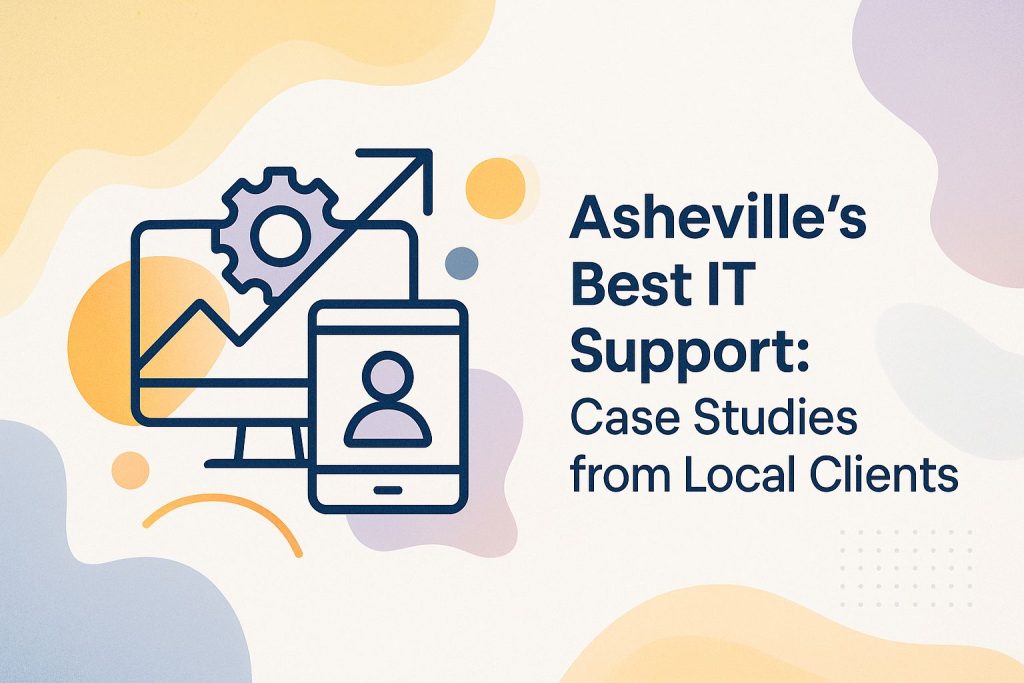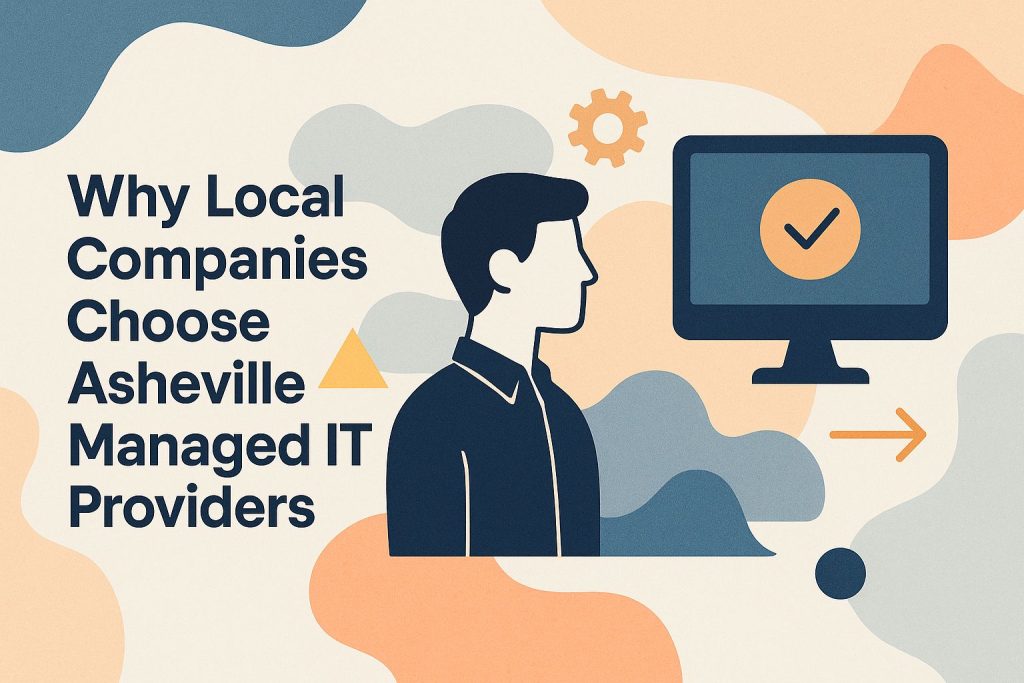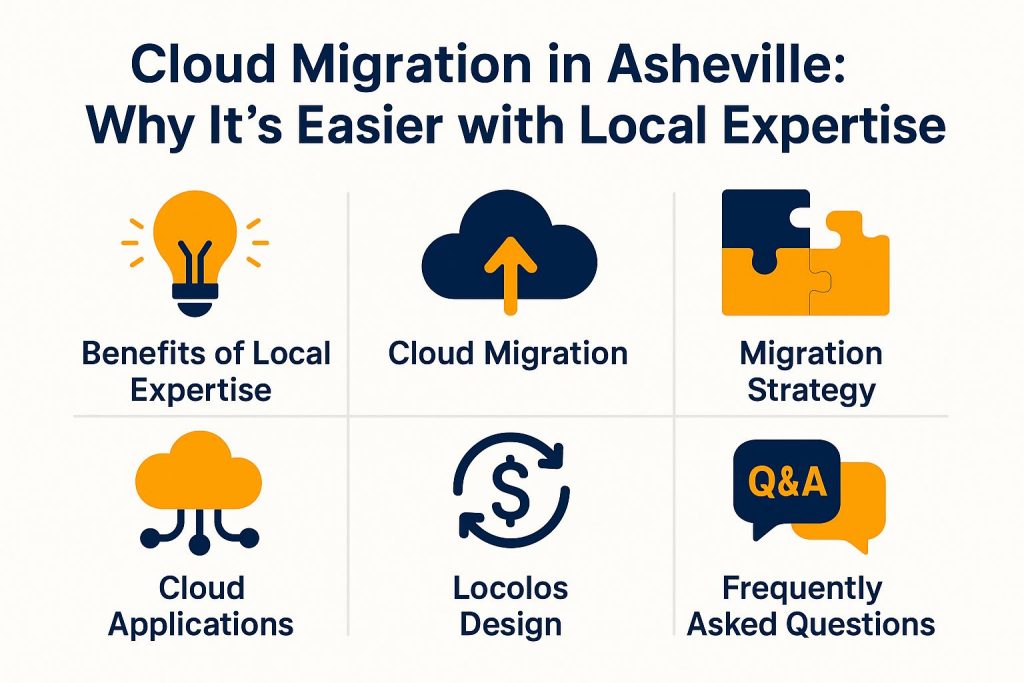Why Asheville Businesses Need Local IT Support

Asheville sits in the heart of the Blue Ridge Mountains. Its thriving businesses, from craft breweries to tourism hubs, face IT pressures. These pressures can cripple operations overnight. A 2023 CompTIA study shows that local disruptions cost small firms up to 20% in revenue each year. This article covers Asheville’s unique IT challenges. It explains why local support beats remote options with fast responses and custom strategies. It also shares steps to choose providers that boost security and growth.
Unique Challenges for Local Businesses
Small businesses in Asheville face unique challenges. The mountains cause frequent power outages. Local rules strictly control data in tourism and healthcare.
Cybersecurity threats add more risks. Phishing attacks hit 30% of small businesses in North Carolina. The FBI’s 2023 IC3 report notes this. For instance, a local store lost $5,000 to ransomware. The attack stopped operations for days. It also hurt customer trust.
Rural broadband gaps slow things down. FCC studies show this. Businesses cannot access cloud services quickly. This hurts inventory for remote stores.
Healthcare providers follow strict rules in North Carolina. House Bill 90 sets these. It fines up to $25,000 for data breaches. NIST guidelines apply.
Hospitality businesses face VoIP overloads in busy tourist seasons. Call connections drop by 40%. This leads to lost bookings.
Potential solutions include:
- Implementing multi-factor authentication using tools such as Microsoft Authenticator;
- Upgrading to satellite-based internet services like Starlink for enhanced reliability;
- Adopting compliant electronic health record (EHR) software, such as Epic;
- And scaling VoIP capabilities with auto-scaling plans from providers like RingCentral.
Advantages of Local IT Support

Local IT support in Asheville offers key benefits. It responds 50% faster than national providers, as detailed in our analysis of why Asheville companies prefer local managed IT services over nationals. This cuts downtime. It boosts productivity.
Quick Response Times
Local IT providers in Asheville keep technicians within 30 miles. They arrive on-site in under one hour for emergencies. This cuts downtime from eight hours to two hours.
CompTIA’s report agrees. Local support cuts resolution times by 60%. It reduces revenue loss. It improves productivity.
To gain these benefits, businesses should follow these steps:
- Establish service level agreements (SLAs) that ensure one-hour response times for critical systems;
- Deploy remote monitoring solutions, such as SolarWinds, to generate proactive notifications regarding potential system failures.
For example, a local craft brewery used this approach. It fixed a POS system issue during busy hours. This saved $1,500 in lost sales.
Businesses should add these to their backup plans. Run drills every quarter. Use cloud backups for quick recovery.
Personalized and Contextual Service
Local providers know Asheville well. They offer custom IT solutions. For example, they tune VoIP for tourism’s busy seasons. Remote services use standard setups.
Custom solutions work well in healthcare and brewing.
Healthcare providers use tools like VeraCrypt for HIPAA-compliant data encryption. This ensures they follow North Carolina’s strict rules to protect patient records. Breweries use IoT sensors on platforms like Particle.io. These sensors monitor inventory in real time. They reduce disruptions during busy times.
The Asheville Chamber of Commerce shares a clear example. A local legal firm updated its old systems with our help. This led to a 25% gain in efficiency.
Start with a full IT audit. Use ManageEngine OpManager for this. It aligns IT with business goals. The process takes one to two weeks.
Remote vs. Local: Key Differences
Remote IT support offers easy scalability for growing business needs. It costs $20-50 per hour. Local services in Asheville offer on-site help for urgent issues. They cut latency problems by up to 70%.
Remote support uses tools like TeamViewer. It costs $30 per month. This allows global access and 24/7 help. It fits cloud services well. But hardware fixes may take longer.
Local options cost $75-150 per visit. This differs significantly from Asheville Managed IT Providers Pricing Models Explained, which often include bundled services for hands-on expertise that fits Asheville’s rules. They handle urgent tasks like network security setups well.
Use remote support for routine software installs. Use local services for complex tasks like manufacturing firewall setups. A hybrid model works well. For example, a retail store uses remote monitoring and local ERP setup. IDC reports show this saves 20-30% in costs.
Enhancing Business Security and Growth
Local IT security measures cut cyber risks by 45% for Asheville businesses. They promote growth with safe cloud services and active monitoring.
Deploy Cisco Secure Endpoint for endpoint protection. It costs $50 per user per year. It halves phishing attacks, per Verizon’s 2023 report. An Asheville hotel recovered from ransomware in four hours. They used Bitdefender antivirus and firewalls. This kept downtime low.
Strengthen security with regular patching. Add multi-factor authentication. For growth, use CRM tools like Salesforce. They increase sales by 20% with safe data sharing.
Follow best practices. Conduct annual IT audits to meet NIST standards. This prevents losses. It gives up to 300% return on investment.
This proactive strategy not only protects critical assets but also enhances customer trust in an increasingly digital economy.
Choosing a Local IT Provider
Choose a local IT provider in Asheville by checking skills in server care and vendor handling. Top firms provide SLAs for 99.9% uptime.
To identify the most suitable provider, organizations should follow these structured steps:
- Research providers in the Asheville Chamber directory. Look for CompTIA-certified ones to ensure skill.
- Examine testimonials and case studies, including instances where a local healthcare provider achieved 30% cost savings through managed IT services (as documented in reports from the NC Small Business Center).
- Evaluate pricing structures; small businesses can anticipate monthly fees of $100-$200, while confirming the value of scalable service plans. Discover our complete strategy for understanding Asheville Managed IT Providers Pricing Models Explained with practical examples tailored to local businesses.
- Confirm the provision of 24/7 support and advanced tools, such as Kaseya, for proactive system monitoring.
- Schedule interviews to assess knowledge of Asheville-specific requirements; the overall selection process generally spans 1-2 weeks.
Avoid non-local firms. They may ignore North Carolina rules. Check reliability with Better Business Bureau (BBB) ratings.
Frequently Asked Questions
Why Do Asheville Businesses Need Local IT Support for Fast Responses?
Asheville businesses need local IT support. It ensures quick responses to technical issues. This minimizes downtime. In a fast-paced environment, delays cost revenue. Local providers arrive on-site fast. They offer hands-on solutions tailored to local needs.
Understanding Regional Challenges with Local IT Support
Local IT providers in Asheville know regional challenges. These include mountainous terrain that affects connectivity. They also understand local regulations. This expertise enables customized IT strategies. National firms often overlook these details.
Cost-Effective Services from Local IT Support
Local IT support saves money for Asheville businesses. Providers have lower travel costs. There are no hidden fees for remote help over long distances. This approach helps with efficient budgeting. It offers budget-friendly managed IT services and outsourcing options. These maintain high-quality tech infrastructure.
Personalized Service and Local Expertise in IT Support
Local IT support provides personalized service to Asheville businesses. It builds long-term relationships. Experts understand specific workflows. They offer face-to-face consultations and on-site help. This fosters trust and proactive solutions. Services include technical support, IT consulting, and maintenance. They also cover staff training, help desk, and ticket systems for reliable uptime and SLA agreements.
Enhancing Security with Local IT Support
Local IT support improves cybersecurity for Asheville businesses. Teams with North Carolina knowledge conduct immediate IT audits and risk assessments. They implement solutions for the local tech scene. Measures include firewalls, antivirus, and data protection. This reduces cyber threats. It ensures business continuity and minimizes downtime with emergency and on-call support.
Scalable Growth and Resilience with Local IT Support
Local IT support helps Asheville businesses scale operations. Providers offer scalable solutions. They understand the local economy, including tourism and arts sectors. This covers retail, hospitality, healthcare, manufacturing, and e-commerce. IT solutions evolve with growth. They support innovation and digital transformation. Services include network support, data backup, computer repair, cloud computing, and more, like 24/7 monitoring and customized plans.




